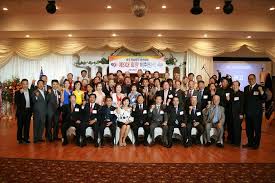CA
ON
부동산캐나다 (Korean Real Estate Post)
전화: 416-449-5552
1995 Leslie Street Toronto, ON
.jfif)
토론토 민박 전문집
전화: 416-802-5560
Steeles & Bathurst ( Yonge) Toronto, ON

고려 오창우 한의원
전화: 416-226-2624
77 Finch Ave W #302, North York Toronto, ON

대형스크린,LED싸인 & 간판 - 대신전광판
전화: 416-909-7070
4065 Chesswood Drive Toronto, ON

호남향우회 (토론토)
전화: 647-981-0404
7 Bishop Ave. #2411 Toronto, ON

K-포차 ...미시사가(만두향프라자)
전화: 905-824-2141
169 DUNDAS ST. E. #7 Mississauga, ON

변호사 정찬수 법률사무소
전화: +82 2-536-1144
서울특별시 서초구 서초동 Toronto, ON
1.jfif)
홍이표치과
전화: 647-985-0456
9625 Yonge St #4, Richmond Hill, ON Toronto, ON
1.jfif)
한인 시니어 탁구협회
전화: 647-209-8933
1100 Petrolia Rd Toronto, ON
4.jpg)
준비된 바이어 그룹 , BAYTREE 이너써클
전화: 416-226-5999
7030 Woodbine Ave. Suite 103 Toronto, ON

캐나다 공인 컨설턴트 - 한인크레딧 컨설팅
전화: 416-897-8438
1 High Meadow Place, Unit 2 North York, ON

1004열쇠
전화: 416-895-1004
4 Blakeley Rd. Toronto, ON

It would be a place where all the visitors including me share the life stories and experiences through their activities,especially on life as a immigrant.
Why don't you visit my personal blog:
www.lifemeansgo.blogspot.com
Many thanks.
블로그 ( 오늘 방문자 수: 148 전체: 226,228 )
한국인들의 인종차별- New York Times
lakepurity
2009-11-07
사진: 한지선씨가 그녀의 친구 Bonogit Hussain씨와 같이 서울 근교에서 버쓰를 타고 오는동안
뒷좌석에 앉아 있던 중년의 남성들이 그들에게 욕설을 퍼붓는 광경을 설명하고 있다.
고국, 대한민국이 1988년도에 하계 올림픽을 치를때, 그들이 내건 슬로건이
'Korea to World, and World to Korea' 였음이 지금도 기억에 뚜렸하다.
오늘 뉴욕 타임스의 '한국인들의 인종 차별'에 대한 기사를 읽으면서, 우리 한국민족의
두얼굴을 똑똑히 보는것 같아, 멀리 해외에서 살아가고 있는 교민의 한사람인 나로서는
이곳 내가 살아가고 있는 현지에서 가끔씩 그런 비슷한 사건이 언론에 보도되는 내용과
비교해 보면서 흔히들 백인들이 유색인종 차별 한다고 떠들어대는 그런 불평은 배부른
헛구호에 불과 함을 느낀다.
이기사에서 보는것 처럼, 한지선씨는 같은 직장 동료인, 인도출신 한 남성과 같이 출퇴근시
뻐스를 타곤 한다고 하는데 그때마다, 많은 사람들이 수근거리는, 특히 중년의 남성들이
이상한 눈초리로 보면서, 때로는 입에 담지 못한 인종멸시의 욕을 해대는 꼴은, 어서 빨리
사라져야 할 고질병인것 같다. 고국 조국은 수출로 먹고 사는 나라라고 해도 과언이 아닌데
왜 그렇게 폐쇄적인 고루한 생각을 버리지 못할까? 혈통을 참많이도 따진다.
조국 대한민국에 순수 혈통이 정말로 있을까? 역사를 보면 , 중국쪽에서 침공하여 국내 여인들을
무참히 짖밟았던 병자 호란, 왜적의 침략으로 조국산천이 짖밟혔던 임진왜란, 최근에는
일본의 강점기등을 거치면서, 순수 혈통이 얼마나 많이 지켜 졌다고 보아야 할까?
어려서 미국이나 기타 서구 다른 나라에 입양되여, 그중에서 간혹 영어교사로 그렇게도
그리던 조국에 와서 일자리를 찾을때, 겉만 보고 퇴자를 놓는 교육기관이 지금도 있다고
언론에 발표되는것을 보면서, 영어선생은 꼭 백인이어야 하는구나 라는 고정관념의 벽이
갈수록 높아져 가는것을 느낀다.
이번 한지선씨의 사건으로 처음으로 검찰 당국이 조사를 해서 해당 남성을 기소하여
현재 재판중에 있다고 하는데..... 그결과가 어떻게 나올지 예측이 된다.
같은 이국인과 사귀어도 백인이면 부러움의 눈초리로 보고, 피부색갈이 검거나 복숭아 색갈이면
천하고 멸시의 대상으로 내려다 보는, 나의 조국 대한민국 사람들의 의식구조는
언제쯤 바뀌어서 일상생활에서도, 해외에서 살아가고 있는 교민들이 다인종 사회속에서
살아가면서 남을 의식하지 않고 살아가듯이, 삶의 한 패턴쯤으로 생각하면서
살아가는, 그래서 특히 백인이 아닌 유색인종들이 주위의 시선을 의식하지 않으면서
살아가는 그런날들이 올까?
아래의 뉴욕 타임스의 기사내용을 옮겨 적는다.
South Koreans Struggle With Race
Jean Chung for the International Herald Tribune
Hahn Ji-seon and her friend, Bonogit Hussain, were riding a bus near Seoul when insults were hurled at them.
By CHOE SANG-HUN
Published: November 1, 2009
SEOUL — On the evening of July 10, Bonogit Hussain, a 29-year-old Indian man, and Hahn Ji-seon, a female Korean friend, were riding a bus near Seoul when a man in the back began hurling racial and sexist slurs at them.
The situation would be a familiar one to many Korean women who have dated or even — as in Ms. Hahn’s case — simply traveled in the company of a foreign man.
What was different this time, however, was that, once it was reported in the South Korean media, prosecutors sprang into action, charging the man they have identified only as a 31-year-old Mr. Park with contempt, the first time such charges had been applied to an alleged racist offense. Spurred by the case, which is pending in court, rival political parties in Parliament have begun drafting legislation that for the first time would provide a detailed definition of discrimination by race and ethnicity and impose criminal penalties.
For Mr. Hussain, subtle discrimination has been part of daily life for the two and half years he has lived here as a student and then research professor at Sungkonghoe University in Seoul. He says that, even in crowded subways, people tend not sit next to him. In June, he said, he fell asleep on a bus and when it reached the terminal, the driver woke him up by poking him in the thigh with his foot, an extremely offensive gesture in South Korea.
“Things got worse for me this time, because I was with a Korean woman,” Mr. Hussain said in an interview. “Whenever I’ve walked with Ms. Hahn or other Korean women, most of the time I felt hostilities, especially from middle-aged men.”
South Korea, a country where until recently people were taught to take pride in their nation’s “ethnic homogeneity” and where the words “skin color” and “peach” are synonymous, is struggling to embrace a new reality. In just the past seven years, the number of foreign residents has doubled, to 1.2 million, even as the country’s population of 48.7 million is expected to drop sharply in coming decades because of its low birth rate.
Many of the foreigners come here to toil at sea or on farms or in factories, providing cheap labor in jobs shunned by South Koreans. Southeast Asian women marry rural farmers who cannot find South Korean brides. People from English-speaking countries find jobs teaching English in a society obsessed with learning the language from native speakers.
For most South Koreans, globalization has largely meant increasing exports or going abroad to study. But now that it is also bringing an influx of foreigners into a society where 42 percent of respondents in a 2008 survey said they had never once spoken with a foreigner, South Koreans are learning to adjust — often uncomfortably.
In a report issued Oct. 21, Amnesty International criticized discrimination in South Korea against migrant workers, who mostly are from poor Asian countries, citing sexual abuse, racial slurs, inadequate safety training and the mandatory disclosure of H.I.V. status, a requirement not imposed on South Koreans in the same jobs. Citing local news media and rights advocates, it said that following last year’s financial downturn, “incidents of xenophobia are on the rise.”
Ms. Hahn said, “Even a friend of mine confided to me that when he sees a Korean woman walking with a foreign man, he feels as if his own mother betrayed him.”
In South Korea, a country repeatedly invaded and subjugated by its bigger neighbors, people’s racial outlooks have been colored by “pure-blood” nationalism as well as traditional patriarchal mores, said Seol Dong-hoon, a sociologist at Chonbuk National University.
Centuries ago, when Korean women who had been taken to China as war prizes and forced into sexual slavery managed to return home, their communities ostracized them as tainted. In the last century, Korean “comfort women,” who worked as sex slaves for the Japanese Imperial Army, faced a similar stigma. Later, women who sold sex to American G.I.’s in the years following the 1950-53 Korean War were despised even more. Their children were shunned as “twigi,” a term once reserved for animal hybrids, said Bae Gee-cheol, 53, whose mother was expelled from her family after she gave birth to him following her rape by an American soldier.
Even today, the North Korean authorities often force abortion on women who return home pregnant after going to China to find food, according to defectors and human rights groups.
“When I travel with my husband, we avoid buses and subways,” said Jung Hye-sil, 42, who married a Pakistani man in 1994. “They glance at me as if I have done something incredible. There is a tendency here to control women and who they can date or marry, in the name of the nation.”
For many Koreans, the first encounter with non-Asians came during the Korean War, when American troops fought on the South Korean side. That experience has complicated South Koreans’ racial perceptions, Mr. Seol said. Today, the mix of envy and loathing of the West, especially of white Americans, is apparent in daily life.
The government and media obsess over each new report from the Organization for Economic Cooperation and Development, to see how the country ranks against other developed economies. A hugely popular television program is “Chit Chat of Beautiful Ladies” — a show where young, attractive, mostly Caucasian women who are fluent in Korean discuss South Korea. Yet, when South Koreans refer to Americans in private conversations, they nearly always attach the same suffix as when they talk about the Japanese and Chinese, their historical masters: “nom,” which means “bastards.” Tammy Chu, 34, a Korean-born film director who was adopted by Americans and grew up in New York State, said she had been “scolded and yelled at” in Seoul subways for speaking in English and thus “not being Korean enough.” Then, she said, her applications for a job as an English teacher were rejected on the grounds that she was “not white enough.”
Ms. Hahn said that after the incident in the bus last July, her family was “turned upside down.” Her father and other relatives grilled her as to whether she was dating Mr. Hussain. But when a cousin recently married a German, “all my relatives envied her, as if her marriage was a boon to our family,” she said.
The Foreign Ministry supports an anti-discrimination law, said Kim Se-won, a ministry official. In 2007, the U.N. Committee on the Elimination of Racial Discrimination recommended that South Korea adopt such a law, deploring the widespread use of terms like “pure blood” and “mixed blood.” It urged public education to overcome the notion that South Korea was “ethnically homogenous,” which, it said, “no longer corresponds to the actual situation.”
But a recent forum to discuss proposed legislation against racial discrimination turned into a shouting match when several critics who had networked through the Internet showed up. They charged that such a law would only encourage even more migrant workers to come to South Korea, pushing native workers out of jobs and creating crime-infested slums. They also said it was too difficult to define what was racially or culturally offensive.
“Our ethnic homogeneity is a blessing,” said one of the critics, Lee Sung-bok, a bricklayer who said his job was threatened by migrant workers. “If they keep flooding in, who can guarantee our country won’t be torn apart by ethnic war as in Sri Lanka?”